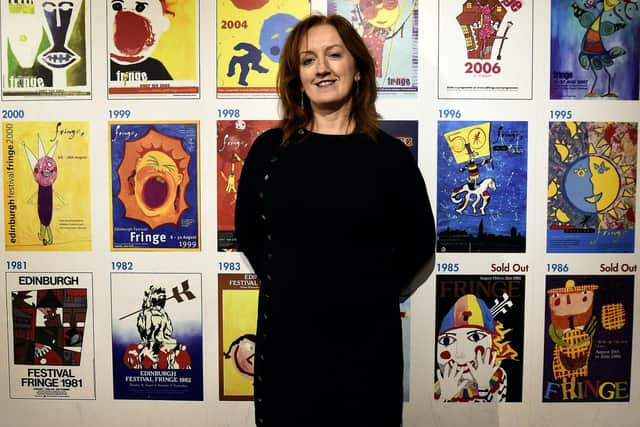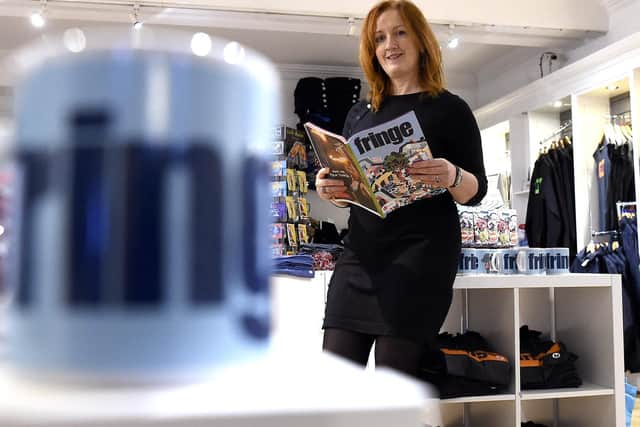From bookies to kettle-making factory, Edinburgh Fringe supremo Shona McCarthy recalls life before the festival


“I was so rubbish at that,” she laughs, explaining, “The pub my father managed at the time was across the street from the bookies. I’d be talking to these men who had wives and five weans at home and were blowing their week’s wages in the bookies asking, ‘Is this really how you want to spend your life, going between the pub and the bookies?’”
Shona’s stint in the Betting Shop was just one of the many jobs she had after leaving university where she did a degree in Film and Media Studies. Fittingly, her first job in the arts found her running a Children’s Film Festival in Belfast for 10 years. She describes it as “a gift of a job” and it was one that left a lasting impression of the power of the arts to change lives, an ethos she has lived by since arriving in the Capital to take the reins of the biggest arts festival in the world.
Advertisement
Hide AdAdvertisement
Hide AdShe confides, “Obviously you can’t have worked in the culture sector for 30 years and not know of the Fringe. I’d been here, loved it, and thought I knew it, but you really can’t understand it fully until you are here, on this side of it where you get an understanding you could never have by coming as a punter.”


Shona “wasn’t really looking for a job” when an email from the Fringe Society landed in her inbox.
“I had just finished working on the Derry-Londonderry UK City of Culture and was in my retreat space, in some ways trying to get my life back,” she recalls, admitting that accepting the job when it was offered wasn’t an easy decision as both her daughters were just finishing Secondary at the time.
Family, I quickly learn, is hugely important to the 51-year-old who grew up, one of eight siblings, in Northern Ireland at a time when your religion dictated everything about your existence.
Advertisement
Hide AdAdvertisement
Hide Ad“I grew up half way between the wee town of Portaferry and Kircubbin in the townland of Ballycran. Our house was on the top of a hill and, because you had to be three miles away to get the school bus and we were two and two-thirds, the eight of us walked to school and back every day - that makes me sound like somebody from the dark ages,” she laughs.


“When you live in a place that isolated you had to either get on really well with your siblings or be good at amusing yourself. Thankfully I did both and was always good at art.”
She continues, “My end of the family were all boys. I grew up surrounded by brothers but there was only so much bow and arrows and go-cart making I could take.
“I had a reflective, thoughtful side and quite liked being on my own, and when I was on my own, I would be drawing.”
Advertisement
Hide AdAdvertisement
Hide AdWinning an art competition in P7 awoke Shona’s creativity. “It was presented to me by the Mayor of Newtonards, the nearest big town where you went for your shopping on Saturday,” she smiles. “My mother was so excited she bought me three dresses because she couldn’t decide on which one I should wear. Winning gave me a feeling of being special, I had done something I found easy and that I was good at - that was my beginning of feeling something for the arts.”
Despite being encouraged by two inspirational teachers, a career ‘in the arts’ still seemed an untouchable goal for the young Shona.
“In many ways, growing up attending a Catholic secondary in the north of Ireland at that time, your history and religious teaching tended to be in the conservative sphere - a history that was provided in a way that semi-denied you your own heritage, the history of Ireland. So the people who really opened my mind were two teachers and I can’t say this enough, when people do surveys about the state of the arts, I say, ‘Go back to the root cause - to where you can change peoples lives, at school’.”
She returns to her point, “As a young person who was never going to be a scientist or mathematician to have those teachers was so important... you respond so much better to people with a passion for what they do.”
Advertisement
Hide AdAdvertisement
Hide AdWhich is how Shona found herself starring in school musicals, as The Narrator in Joseph and the Mother Abbess in The Sound of Music. “Climbing every mountain,” she laughs, adding “a bloody hard song to sing and one they still make me sing really badly when the family get together.”
After a moments thought, she says, “Aside from the arty-ness of it, there was a confidence from being allowed a voice to be creative and I discovered I loved poetry, literature and books.
“I even got offered a place at art college, but coming from a family where the arts were not talked about, it was like, ‘You’re going to do what?’ There was a sense of the arts not being a career and the only reason I got away with it was because I was the youngest girl.”
Now with her own family and partner Bobby, Shona, a self-confessed ‘jigsaw nut’ (“Tables are cleared and there are jigsaws everywhere”), has spent the last four years splitting her time between the family home in Ballycastle and Edinburgh.
Advertisement
Hide AdAdvertisement
Hide Ad“My daughter Toraigh is in her final year in London and the younger one, Dara, is here now,” she exclaims with heartfelt glee, “It’s made Edinburgh feel like home. After all the to-ing and fro-ing I’m gradually hooking them all in.”
But just where is home? “You’ve asked just as the axis is starting to shift,” she admits. “If you asked me that up until this point, the answer would have been, ‘Edinburgh is work and home is home’. But I’ve just got a flat in Leith and I’m so excited. It took me four years of living here to make the decision that I’m here for the long-haul.”
Settling in Leith will no doubt allow Shona to pursue her long-held desire to help people “find the space in which to grow.”
“I really am passionate about that because there’s so much provision for other things in our education system, science, technology, sport, but the arts always seems to get cut out. So, what about the wee boy who grows up with a hurling stick in one hand but, actually, the thing he loves most is being in the hurling choir? Where is the outlet for the part of him that loves and responds to music?”
Advertisement
Hide AdAdvertisement
Hide AdWhere better than at the Fringe, where Shona says simply, “you will experience the impossible.”
She reflects, “The thing that changed my life was discovering the poet Seamus Heaney, he could make me see the ordinary through a different lens.
“Growing up in Northern Ireland, everything is so bound by the geography in which you were born, the school you went to, whether you are green or orange, protestant or catholic, nationalist or unionist, everybody wanted to define you in these really narrow terms. And then Heaney comes up with this notion of a fifth province, the imagination. A place where we can choose to exist because of something that inspires us...
“I love that idea and believe the Fringe is the fifth province, a place where anything can happen, where people can get off the train at the Waverley and go, ‘This is my community, a place of creativity, and these are the people I want to be amongst. Yes, there are things that we need to fix about the Fringe, ways it can be made better, but for Christ’s sake, don’t forget that in the midst of all of that, we have this extraordinary platform for freedom of expression.”